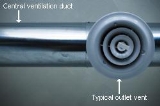
HVAC
Overview
Mechanical engineering
Mechanical engineering is a discipline of engineering that applies the principles of physics and materials science for analysis, design, manufacturing, and maintenance of mechanical systems. It is the branch of engineering that involves the production and usage of heat and mechanical power for the...
, based on the principles of thermodynamics
Thermodynamics
Thermodynamics is a physical science that studies the effects on material bodies, and on radiation in regions of space, of transfer of heat and of work done on or by the bodies or radiation...
, fluid mechanics
Fluid mechanics
Fluid mechanics is the study of fluids and the forces on them. Fluid mechanics can be divided into fluid statics, the study of fluids at rest; fluid kinematics, the study of fluids in motion; and fluid dynamics, the study of the effect of forces on fluid motion...
, and heat transfer
Heat transfer
Heat transfer is a discipline of thermal engineering that concerns the exchange of thermal energy from one physical system to another. Heat transfer is classified into various mechanisms, such as heat conduction, convection, thermal radiation, and phase-change transfer...
. Refrigeration
Refrigeration
Refrigeration is a process in which work is done to move heat from one location to another. This work is traditionally done by mechanical work, but can also be done by magnetism, laser or other means...
is sometimes added to the field's abbreviation as HVAC&R or HVACR, or ventilating is dropped as in HACR (such as the designation of HACR-rated circuit breakers).
HVAC is important in the design of medium to large industrial and office buildings such as skyscraper
Skyscraper
A skyscraper is a tall, continuously habitable building of many stories, often designed for office and commercial use. There is no official definition or height above which a building may be classified as a skyscraper...
s and in marine environments such as aquarium
Aquarium
An aquarium is a vivarium consisting of at least one transparent side in which water-dwelling plants or animals are kept. Fishkeepers use aquaria to keep fish, invertebrates, amphibians, marine mammals, turtles, and aquatic plants...
s, where safe and healthy building
Sick building syndrome
Sick building syndrome is a combination of ailments associated with an individual's place of work or residence. A 1984 World Health Organization report into the syndrome suggested up to 30% of new and remodeled buildings worldwide may be linked to symptoms of SBS...
conditions are regulated with respect to temperature and humidity, using "fresh air" from outdoors.
Heating, ventilating, and air conditioning is based on inventions and discoveries made by Nikolay Lvov
Nikolay Lvov
Nikolay Aleksandrovich Lvov was a Russian artist of the Age of Enlightenment. Lvov, an amateur of Rurikid lineage, was a polymath who contributed to geology, history, graphic arts and poetry, but is known primarily as an architect and ethnographer, compiler of the first significant collection of...
, Michael Faraday
Michael Faraday
Michael Faraday, FRS was an English chemist and physicist who contributed to the fields of electromagnetism and electrochemistry....
, Willis Carrier
Willis Carrier
Willis Haviland Carrier was an American engineer and inventor, and is known as the man who invented modern air conditioning....
, Reuben Trane
Reuben Trane
Reuben Nicholas Trane founded Trane, the heating and air conditioning company, with his father James Trane....
, James Joule, William Rankine, Sadi Carnot
Nicolas Léonard Sadi Carnot
Nicolas Léonard Sadi Carnot was a French military engineer who, in his 1824 Reflections on the Motive Power of Fire, gave the first successful theoretical account of heat engines, now known as the Carnot cycle, thereby laying the foundations of the second law of thermodynamics...
, and many others.
The invention of the components of HVAC systems went hand-in-hand with the industrial revolution
Industrial Revolution
The Industrial Revolution was a period from the 18th to the 19th century where major changes in agriculture, manufacturing, mining, transportation, and technology had a profound effect on the social, economic and cultural conditions of the times...
, and new methods of modernization, higher efficiency, and system control are constantly introduced by companies and inventors all over the world.
Unanswered Questions

